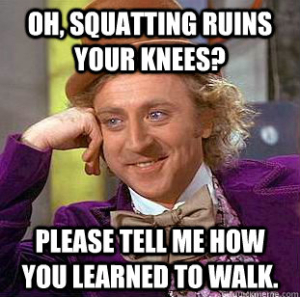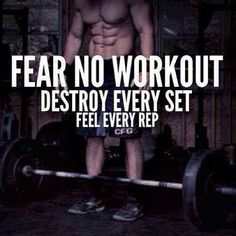Make one, little confession about not squatting or deadlifting, and everyone loses their shit.
I actually feel great since I came out of the “non-powerlifting closet”.
It’s like a weight has been lifted (no pun intended) off of my shoulders.
I feel like screaming it from the rooftops:
I DON’T SQUAT OR DEADLIFT AND I FEEL (AND LOOK) AMAZING!
I think I hear the blood pressure of many of my clients increasing……………….
So, what in the hell am I talking about here? What is my point of this rambling?
Let’s back up a bit, shall we?
What Is “Fuckarounditis”, Really?
At the start (of my journey, anyways), there was Martin Berkhan, founder of Leangains.
He was just starting to disappear from the public eye, as the fitness social media scene was starting to swallow him whole.
Andy Morgan filled in the void quite nicely, and I latched onto his teachings and articles.
And at the forefront was the idea to eradicate “Fuckarounditis”.
In short, you needed to maximize the return on your energy, your time, and your wallet.
You had to utilize a few techniques to max out this “ROI”:
- In your diet?
- You fasted – to keep things easy – just two meals per day.
- You macro counted to ensure proper caloric intake.
- You neglected your fibrous veggies to keep yourself sane.
- In your training?
- You squatted, deadlifted, and bench pressed – the “full body lifts”.
- You followed a basic, linear progression model to ensure strength accumulation.
- You rested often, to conserve energy and promote recovery.
- With your “wallet”?
- You neglected 98% of the supplement industry.
- You didn’t fall for fancy woo-woo such as Paleo, the organic movement, or vegan extremes.
You kept things simple and basic.
You neglected all the rest.
You didn’t “fuck around”. You employed the straight forward strategies which have always worked. And WILL always work.
So I did. For a very long time.

Diminishing Returns?
Following minimalist, “non-fuckery” approaches worked wonders for me.
(If you want a free minimalist, “non-fuckery” approach, here’s a link for you.)
I shred fat like it was my job. Which is good, because it quickly was becoming my job.
My squat went from 95 pounds to 315 in a few years.
My deadlift went from 185 pounds to 500 in the same timeframe.
I can also say I’ve bench pressed 305 pounds – in a full range of motion.
I got strong.
I can surely say that. Using the Big 3 religiously taught me a great deal about myself.
- I finally understood the importance of consistency.
- I fully realized how important it was to show up – every single day – to train.
- I broke through self-imposed barriers and realized my true strength potential.
- I had hovered around a 275 bench press for a long time, thinking it was my genetic potential.
- I was able to shatter that number and reach the 300’s.
- I conquered psychological shortcomings.
- I was often scared to add 5 more pounds to a lift, especially on squats.
- But each time I faced my fears and got under the bar, the experience was rewarding. Terrifying, but rewarding.
- I was able to use this “fear ignorance” and relay it to other areas of my life – relationships, business, work, etc.
- I began to not fear failure, and not care about minutiae in my life.
- Everything seemed “easy” compared to a new squat PR.
To the untrained, there is no better way to see what you’re made of than to start – and stick to – a simple, linear progression of the basics.
The basics will take you far, in lifting and in life.
But self-reflection is one of my strong points. It can also be said it’s one of my weaknesses. It depends on your framing of the matter.
There were negatives to my minimalist, powerlifting based routines.
- I began to dread my workouts.
- At first, it’s fun to ignore the fear and get under the bar.
- Eventually, it can begin to zap you of the fire and vigor that led you to the gym in the first place.
- I began to fear injury.
- Perfect form helps to eliminate the risk for injury.
- But the injury bug will infect every lifter eventually, and I wasn’t immune by a long shot.
- I lost the fire for “big numbers”.
- Yes, it was cool to say my numbers were 305-315-500 on the Big 3.
- But how much further was I really willing to push it?
- My quality of life was slipping.
- After a deadlifting session, all I wanted to do was sleep.
- After a squatting session, it took 48 hours for my legs to return to normal.
- Everyday activities – walking down stairs, playing with my kids, etc. – became taxing, and I would spend my weekends on the couch.
I began to survey my training, thinking about what my purposes were for training.
I came up with 3, main goals:
- Look good.
- Feel good.
- Be strong enough to tackle the tasks of “everyday life” with ease.
And what were my “everyday tasks”?
Do you need to be able to deadlift 600 pounds to move furniture to vacuum?
Do you need to squat 400 pounds to lift my kids off of the floor?
Is a 300 pound bench press really necessary to push the lawn mower?
I knew I was never going to be a powerlifter, as I have no desire to hit the platform.
If my personal goals didn’t necessitate these huge lifting numbers, then why was I continuing to do them?
Perhaps you are asking yourself that exact, same question.
The Silent Majority
March, 2015 was the last month I completed a barbell squat – front or back.
It was also the last month I pulled a deadlift from the floor.
It’s not that I don’t “go hard” in the gym. I am as intense as they come, and I train consistently, rarely missing a workout.
There may not be any “total body moves” as effective as the squat or deadlift.
There also may not be any moves which increase your raw strength as quickly as performing this duo religiously.
But if your primary goal doesn’t revolve around “triple-bodyweight-anything”, there are other ways to improve your physique.
- I began incorporating weighted pull-up and chin-up variations into my workouts much more frequently.
- I varied hand positions, tried various rep/set schemes, and upped my frequency of these moves dramatically.
- I started to use the leg press machine with a purpose.
- Without balance being a limiting factor due to my immense size (6’8″), I was able to focus on my muscular development specifically with fantastic results.
- I was able to increase the number of times each week I hit each muscle group.
- Without being so spent by performing the total body moves, I found I could train more often, recover better, and make faster progress overall.
- My life quality improved as a result.
- Soreness decreased dramatically, as physique improvements increased.
- I no longer spent every weekend on the couch, and I had more energy as a result.
- My training became fun once more.
- My passion for the gym grew by leaps and bounds.
These conclusions in my own, personal training routines led me to wonder:
How many others are there out there who are tired and burned out of the “Big 3”, but think they are a requirement to look good, feel good, and have a high quality of life?
The Echo Chamber
My admission that I’m “squat/deadlift” free has received mixed results from the fitness elite.
Some approve.
Others do not.
Some wonder how a “fitness professional” can make these statements and not be “sacrilegious”, so to speak.
EVERYONE KNOWS that squatting and deadlifting cures all.
Weakness? Obesity? Fear? Shortcomings? Hunger? Cancer? World Peace?
Yep, squatting and deadlifting cures everything.
Maybe it’s my view that has caused me to question the thinking of the masses.
You see, I spent 12 years of life as a “normal person” – a classroom teacher who worked a regular job.
I spent a good amount of my life as a “fat guy” who hated the gym. “Gym-bros” were douchebags. I loathed them, mostly out of jealousy.
What is the entry to fitness? The entry to weightlifting? The entry to muscularity? The entry to masculinity?
Perhaps it IS squatting and deadlifting. They DO work. They increase athletic ability, confidence, physique – they’re excellent movements, and I cannot deny the powerful effect they have had on many.
But are they necessary?
I have come across many “regular people” who have admitted to me that the reason they have stopped their fitness regimens is because they hate the “powerlifting moves”.
They fear the back squat, or despise the deadlift.
They are fearful of injury, or they make them abnormally sore for days.
Should we tell them to “grow a pair” and “suck it up”?
Should we tell them to “piss off and become a man (or woman)”?
Should we tell them they should just “stay the same, because they’ll never improve themselves”?
Maybe a really cool, inspirational meme will help them.
Here, will this help?

I suggest we work together to find another way.
I propose you find a way that works for you.
I encourage you to keep at it. Keep training, keep eating right, keep tinkering, and stay curious.
The “Big Rocks” of training are simple.
Show up and go hard.
What that phrase means to the “goo-roos” might be very different from what that means to you.
~Jason
